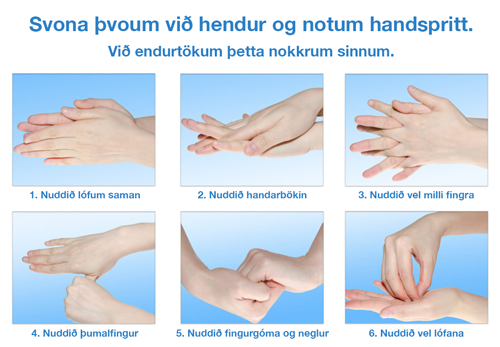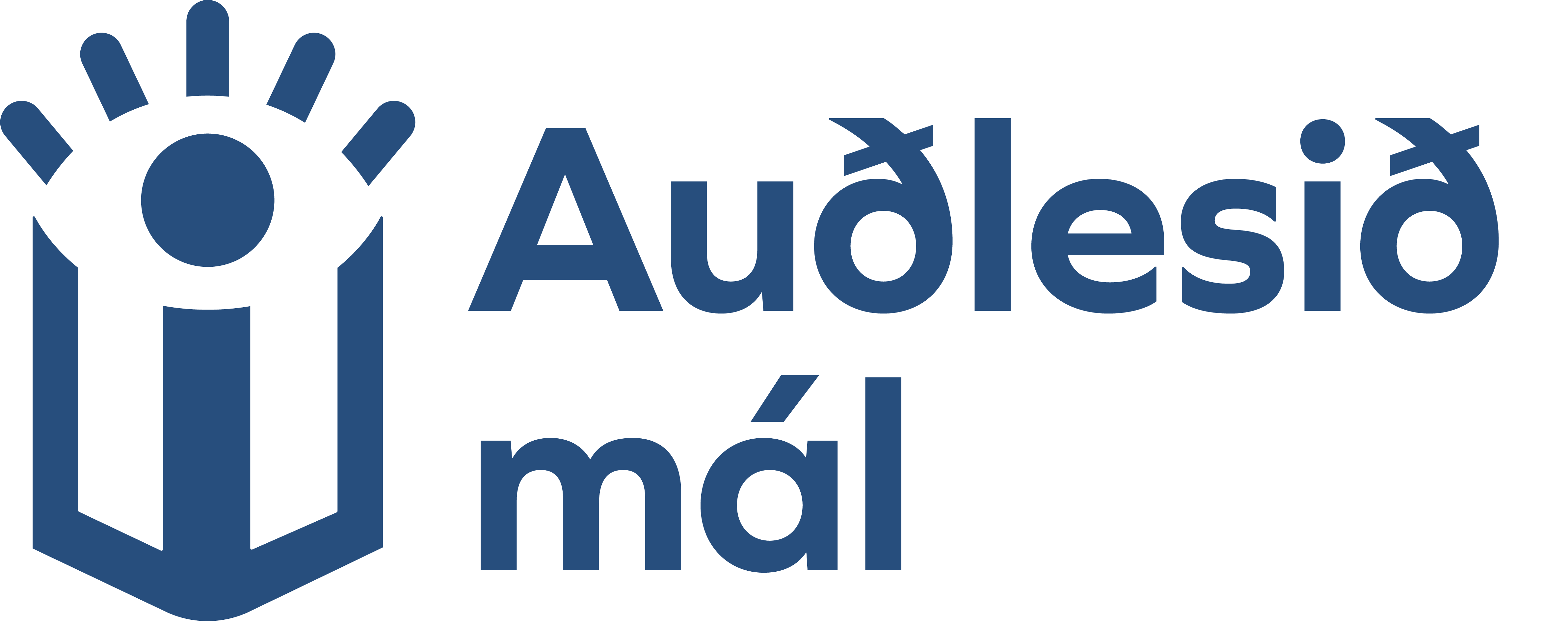This reading material is prepared by Þroskahjálp
in collaboration with the Directorate of Health
and the Ministry of Health.
It is important that we all have access
to information that is helpful and correct.
|
COVID
Coronavirus
Easy-to-read information
4th edition
|
|
 |
|
|
COVID has had a great impact on our lives.
It is important that we all have access
to information about COVID
including people with disabilities.
This reading material is by Þroskahjálp
in collaboration with the Directorate of Health
and the Ministry of Health.
|
|
|
|
2 of 30 |
|
Here we will talk about:
· What is COVID?
· How is COVID transmitted?
· What are the symptoms?
· What to do if we get COVID?
· What are special precautions?
· How do we isolate ourselves?
· Are there medicines for COVID?
· Helpful tips on how to be cautious
|
3 of 30 |
to top of page
|
What is COVID?
COVID is a virus that can make people very sick.
COVID is very contagious.
That means that one person with COVID
can get other people sick with COVID.
COVID is transmitted between people.
Some animals can also become sick.
|
5 of 30 |
|
How is COVID transmitted?
The COVID virus is too small for us to see.
It is almost invisible.
The COVID virus can float in the air.
For example when someone coughs or sneezes.
· That is why we wear a mask.
The COVID virus can be on things.
For example a doorknob or an elevator button.
· That is why we use hand sanitiser.
|
6 of 30 |
to top of page
|
How is COVID transmitted?
We can get infected with COVID:
· if we are close to people who have COVID
· if we hug other people
· if we sleep in the same bed as someone else
· if we are in the same house
Masks and hand sanitiser help us:
· not get infected by other people
· not infect other people
|
7 of 30 |
|
Is COVID monitored?
Scientists are researching the COVID virus
using special devices.
Scientists help set rules to make sure
that sick people don’t infect others.
Scientists have created medicines.
These medicines are called vaccines.
Scientists monitor when the virus changes.
|
8 of 30 |
|
What happens
when COVID changes?
When the COVID virus changes
it can become many types of COVID.
People can get sick in a different way.
People can get infected in a different way.
Children can start getting infected with COVID
more than adults.
When COVID changes the rules may change.
We might see new rules.
Or that old rules are no longer needed.
|
9 of 30 |
to top of page
|
Does COVID have
many names?
When people talk about COVID
they sometimes say:
· COVID-19
· the Coronavirus
· Delta
· Omicron
These are many names for COVID.
These names help scientists who watch COVID.
|
10 of 30 |
|
COVID symptoms
What does it mean to have a symptom?
It means when we can see or feel that we are sick.
COVID symptoms are:
· Cough
· Fever
· Pain in the body or the limbs
· Weakness
· Loss of taste and lost of smell
|
11 of 30 |
|
COVID symptoms
Some people who get sick from COVID
lose their sense of taste and smell.
These are specific symptoms of COVID.
If we notice that we
lose our sense of taste or smell
we need to tell a doctor.
|
12 of 30 |
to top of page
|
How do people know
they have COVID?
COVID tests tell us if we have the virus.
When do we get tested for COVID?
· When we are sick.
· When we have COVID symptoms.
· When we are near people who have COVID.
· When we are in the same house as people
who have COVID.
|
13 of 30 |
|
I think I have COVID
COVID is very infectious.
If you think you have COVID:
· wear a mask
· get tested for COVID
· do not be near other people
You always have to tell someone.
· You can call the healthcare centre at 513-1700
· You can tell people you trust.
|
14 of 30 |
|
What can people do
if they are sick?
When we are sick
we need to take good care of our body.
We stay home and rest.
We allow the body to recover.
It can take a few days until we feel better.
That is why it is important that we are careful.
|
15 of 30 |
to top of page
|
What can people do
if they have
a contagious disease?
When we have a contagious disease
we also need to make sure
that we do not infect other people.
Therefor we are not near other people
until we have completely recovered.
COVID is very contagious.
When we have COVID and we are very sick
it is important that we are not near other people.
That is so we don’t infect other people with COVID.
|
16 of 30 |
|
What can people do
if they have COVID?
We need to make sure that people with COVID
do not infect other people.
If we have COVID and we are very sick:
· We stay home.
· We try not to see other people.
· We try to isolate ourselves.
If we have COVID and we are not sick:
· We use special precautions for 5 days.
· We always wear a mask.
|
17 of 30 |
to top of page
|
Has COVID.
Much sickness and pain.
Has COVID symptoms.
Must stay home.
Tries to not see other people.
Best to isolate.
|
Has COVID.
No feeling of sickness.
Does not have COVID symptoms.
Uses special precautions
for 5 days.
Allowed to work and attend school.
Best to always wear a mask.
|
|
What can people do
who have COVID
and are very sick?
When we are very sick we need to stay home.
COVID is very contagious.
Therefore it is best that we are alone.
We are alone so we do not infect other people with COVID.
This is called isolating yourself.
The Chief Epidemiologist recommends that we do this
if we have COVID and we are very sick.
|
19 of 30 |
|
What can people do
who are in isolation?
When we have COVID and we are very sick
we can isolate at home or in another place.
If people who live with us also have COVID
we can isolate together.
We do this until we have recovered.
|
20 of 30 |
|
What can people not do
when they are very sick?
When we are very sick we need to stay home.
We rest and allow our body to recover.
Do not see other people.
Do not see friends or family.
Do not go to work or school.
Do not go shopping or to a restaurant.
Do not go for a drive.
Do not use the bus or a taxi.
Do not go where there are a lot of people.
|
21 of 30 |
to top of page
|
Special Precautions
We use special precautions when we have COVID
· and are not sick and do not have symptoms
We might feel like we are not sick.
But our COVID test says that we have COVID.
That is why we use special precautions for 5 days.
We also use special precautions
when we have been near someone who has COVID.
|
22 of 30 |
|
What can people do
who use special precautions?
We can go to work and school and play sports.
We always wear a mask.
We always have to be careful.
· We do not go where there are a lot of people.
· We do not go into a hospital or a healthcare facility.
· We do not see sick people or very old people.
· We do not see small children.
· We try to not go to the store.
|
23 of 30 |
|
Do all people who get COVID
become very sick?
Some people do not get very sick.
Other people get very sick.
People who are healthy often get less sick from COVID.
They could feel like they have a cold or the flu.
People who have other diseases
can get very sick from COVID.
We must all be careful.
|
24 of 30 |
|
COVID has had a great impact on our lives.
If we are scared it is good to talk
to someone we trust.
We are all welcome to call
the Red Cross Helpline at 1717.
The call is free of charge.
|
25 of 30 |
to top of page
|
Are there medicines
for COVID?
Yes, we now have vaccines for COVID.
Vaccines are medicine.
If we receive these vaccines:
· we are less likely to get COVID
· we are less likely to get very sick from COVID
You can read more about vaccines
at Auðlesið.is/covid
|
26 of 30 |
|
Helpful tips
When we sneeze or cough:
· We put our elbow in front of our face.
· We use paper towels and throw them in the garbage.
· We wash our hands with soap.
When do we take a COVID test?
· When we are sick.
· When we have COVID symptoms.
· When we are close to people who have COVID.
· When we are in the same house
as people who have COVID.
|
27 of 30 |
|
Helpful tips
We wear a mask.
We keep a distance between us and other people.
We use hand sanitiser.
We wash our hands often and well with soap:
· always before we touch our face
· always before we eat
· always when we come home
|
28 of 30 |
|
How to wash your hands

|
We wash our hands with soap
for 20 to 30 seconds.
It is a good idea to sing
the Happy Birthday song twice
while we wash our hands.
Then we have washed our hands
for long enough.
.
29 of 30
|
|

You are always welcome to call
if you need information or advice
Þroskahjálp
the Icelandic Association
of Persons with Intellectual Disabilities
tel. 588 9390
30 of 30
|
to top of page




